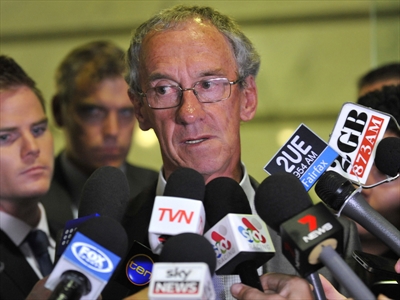Cobalt Threshold Under Fire At Inquiry
- Tuesday, 24 February 2015 07:10
The absence of a cobalt threshold in NSW means trainer Darren Smith has no case to answer, his counsel has told stewards.
Nominations from Smith's stable have been refused since May when 21 samples from 17 individual horses returned high levels of cobalt.
At the time, there was no threshold in place in NSW but Smith has been charged with 62 breaches of the rule which says products which alter a horse's blood picture are prohibited.
 Racing NSW chief steward Ray Murrihy
Racing NSW chief steward Ray Murrihy
A threshold of 200 micrograms per litre of urine was adopted nationwide in January.
A reading of more than 6000 was recorded in one of the 21 positive samples from horses trained by Smith with others well in excess of the threshold now adopted.
Paul O'Sullivan, who represented Smith at a Racing NSW stewards hearing on Tuesday, said without the threshold in place, Smith had no charge to answer.
The trainer has admitted injecting horses with a substance from an unlabelled bottle given to him by disqualified harness racing trainer Shannon Wonson who described it as a blood booster.
"We suggest there is some point where cobalt goes from being permissible to being prohibited," O'Sullivan said.
"No-one knew what the line was.
"Darren Smith has said from the outset he got a bottle from Shannon Wonson.
"All the charges rely on cobalt at certain levels being a prohibited substance.
"No-one knew what that level was because there was no threshold.
"There was no green light, no red light, no-one had any idea."
Murrihy said the 200 mcg level already in place at the time in harness racing might have given a clue.
"Harness racing trainers were being disqualified at the time, that might have rung a bell," he said.
"Darren Smith used an unprescribed, unlabelled, unregistered bottle of a substance."
O'Sullivan also called for the evidence of expert witness Professor Paul Mills to be rejected.
Mills described the levels returned by some of Smith's horses as toxic.
Cobalt chloride has been used in humans to treat certain conditions like anaemia. It is banned by WADA because it increases red cell production which in turn increases EPO.
Several owners of horses previously trained by Smith made submissions on the potential disqualification of their horses and criticised the length of time taken for the inquiry to be held.
Ralph Portaro, a part-owner of Testarhythm, winner of the Ortensia Stakes at Scone in May, said the gelding had been carrying extra weight because of his stakes win.
"It has been ten months and we have had no prize money but he hasn't been disqualified," Portaro said.
"Testarhythm has had to carry seven ratings points in that time.
"It is depriving him of the chance to win and has cost us."
Stewards expect to announce their findings within a week.

